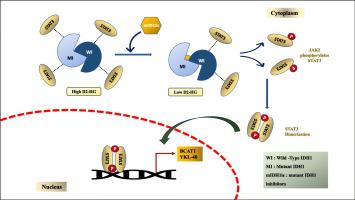Biochimica et Biophysica Acta (BBA) - Molecular Cell Research ( IF 4.6 ) Pub Date : 2021-07-28 , DOI: 10.1016/j.bbamcr.2021.119114 Debanjan Bhattacharjee 1 , Kancharana Balabhaskararao 1 , Nishant Jain 1

|
IDH1 mutations are frequent and early events in gliomas. Mutant IDH1 produces D-2HG that causes epigenetic changes by increasing histone and DNA methylations, thereby contributing to tumor growth. Mutant IDH1 rewires metabolism and endows a few therapeutic vulnerabilities in cells. But, mutant IDH1 inhibitor(s) treatments reverse these therapeutic vulnerabilities by increasing cell growth. Nevertheless, it is unclear how mutant IDH1 inhibitor(s) increases cell growth. As mutant IDH1 inhibitor(s) increase cell growth, therefore we asked whether mutant IDH1 inhibitor(s) activate oncogenes in mutant IDH1-expressing cells. To answer this question, we used allosteric mutant IDH1 inhibitors to treat mutant IDH1-expressing HT1080 cells, and examined for activation of oncogenes by assessing the levels of our read-outs: BCAT1 and YKL-40. We found that mutant IDH1 inhibitors' treatments increased BCAT1 and YKL-40 levels in HT1080 cells. Next, we observed that mutant IDH1 inhibitors activated STAT3 by phosphorylation at Tyr-705 position (pSTAT3-Y705) and its nuclear translocation. Upon examining the molecular mechanism of pSTAT3-Y705 activation in mutant IDH1 inhibitor-treated cells, we found that mutant IDH1 strongly bound STAT3, but mutant IDH1 inhibitor treatment decreased mutant IDH1-STAT3 binding. Furthermore, we observed that STAT3-knockdown and pharmacological inhibition of STAT3 attenuated the mutant IDH1 inhibitor-mediated increase in BCAT1 and YKL-40 levels, whereas STAT3 overexpression and Interleukin-6 (STAT3 activator) treatments increased BCAT1 and YKL-40 levels. We conclude that mutant IDH1 inhibitors activate the oncogenic transcription factor-STAT3 leading to an increase in BCAT1 and YKL-40 levels in mutant IDH1-expressing cells.
中文翻译:

突变 IDH1 抑制剂激活 pSTAT3-Y705,导致表达突变 IDH1 的细胞中 BCAT1 和 YKL-40 水平增加
IDH1 突变是胶质瘤中常见的早期事件。突变体 IDH1 产生 D-2HG,通过增加组蛋白和 DNA 甲基化引起表观遗传变化,从而促进肿瘤生长。突变体 IDH1 重新连接新陈代谢并赋予细胞一些治疗漏洞。但是,突变的 IDH1 抑制剂治疗通过增加细胞生长来逆转这些治疗脆弱性。然而,目前尚不清楚突变的 IDH1 抑制剂如何促进细胞生长。由于突变 IDH1 抑制剂会增加细胞生长,因此我们询问突变 IDH1 抑制剂是否会激活表达 IDH1 的突变细胞中的癌基因。为了回答这个问题,我们使用变构突变 IDH1 抑制剂来治疗表达突变 IDH1 的 HT1080 细胞,并通过评估我们的读数水平来检查致癌基因的激活:BCAT1 和 YKL-40。我们发现突变的 IDH1 抑制剂治疗增加了 HT1080 细胞中的 BCAT1 和 YKL-40 水平。接下来,我们观察到突变的 IDH1 抑制剂通过在 Tyr-705 位置(pSTAT3-Y705)的磷酸化及其核易位激活 STAT3。在检查突变体 IDH1 抑制剂处理的细胞中 pSTAT3-Y705 激活的分子机制后,我们发现突变体 IDH1 强烈结合 STAT3,但突变体 IDH1 抑制剂处理降低了突变体 IDH1-STAT3 的结合。此外,我们观察到 STAT3 敲低和 STAT3 的药理抑制减弱了突变 IDH1 抑制剂介导的 BCAT1 和 YKL-40 水平的增加,而 STAT3 过表达和白细胞介素 6(STAT3 激活剂)治疗增加了 BCAT1 和 YKL-40 水平。











































 京公网安备 11010802027423号
京公网安备 11010802027423号